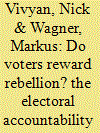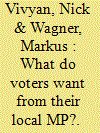| Srl | Item |
| 1 |
ID:
111506


|
|
|
|
|
| Publication |
2012.
|
| Summary/Abstract |
To hold their Members of Parliament individually accountable for their legislative behaviour, British voters would need to base their decision to vote for an MP at least partially on the extent to which the MP's legislative voting behaviour deviated from that of the MP's party leadership. Voters should evaluate this deviation contingent on their views of the party leadership. MP rebellion can signal that voter-MP congruence is greater than that of the voter and the MP's party leadership. In this article it is found that only constituents with negative attitudes toward the Labour government reward rebellious Labour MPs, albeit to a limited extent. A similar conditional association is not observed on a single issue: Iraq. The policy accountability of MPs is relatively weak and general rather than issue-specific.
|
|
|
|
|
|
|
|
|
|
|
|
|
|
|
|
| 2 |
ID:
138269


|
|
|
|
|
| Summary/Abstract |
This article summarises the findings from a study of what constituents want from their local Member of Parliament.1 We make use of a survey technique known as conjoint analysis, wherein we present a national sample of British voters with profiles of hypothetical MPs who vary randomly in their characteristics, activities and behaviour. We find that voters like MPs who are independent from the party line and who do not focus exclusively on national policy work. MPs' gender and experience matter far less to constituents. Overall, voters want a Parliament made up of strong-minded MPs who see their role as that of a constituency representative. This has important implications for parliamentary democracy in Britain.
|
|
|
|
|
|
|
|
|
|
|
|
|
|
|
|
| 3 |
ID:
111500


|
|
|
|
|
| Publication |
2012.
|
| Summary/Abstract |
Parties have an incentive to take up extreme positions in order to achieve policy differentiation and issue ownership, and it would make sense for a party to stress these positions as well. These incentives are not the same for all issues and all parties but may be modified by other strategic conditions: party size, party system size, positional distinctiveness and systemic salience. Using manifesto-based measures of salience and expert assessments of party positions, the findings in this article are that parties emphasise extreme positions if, first, they are relatively small in terms of vote share; second, the extreme position is distinctive from those of other parties; and third, other parties fail to emphasise the issue. These findings have consequences for our understanding of party strategies, party competition and the radicalisation of political debates.
|
|
|
|
|
|
|
|
|
|
|
|
|
|
|
|